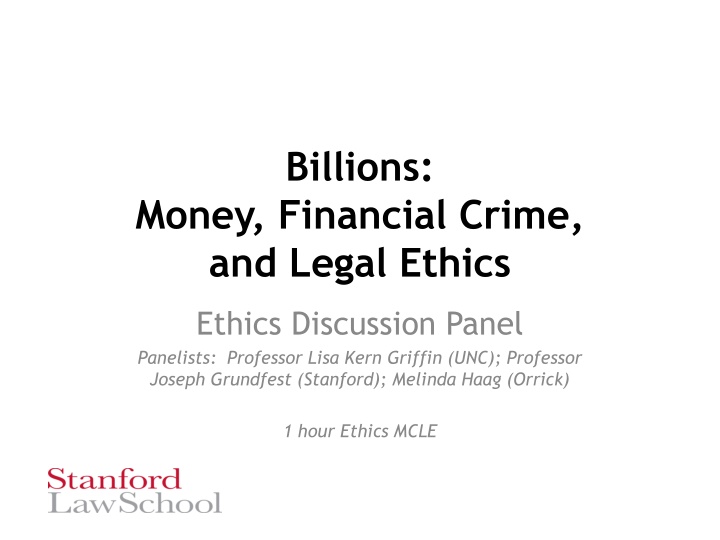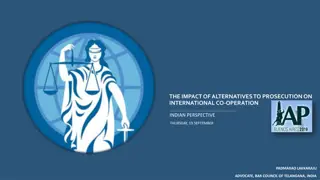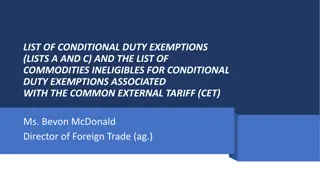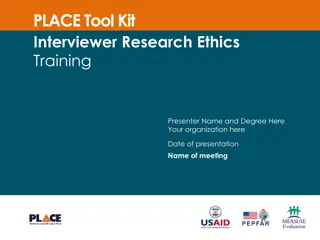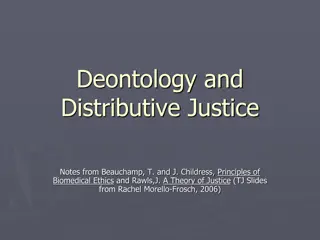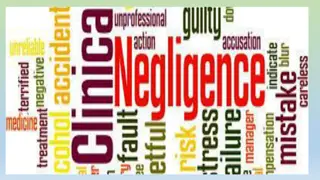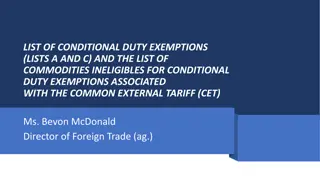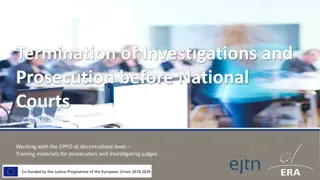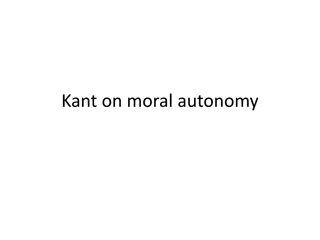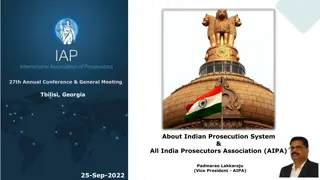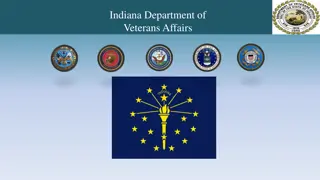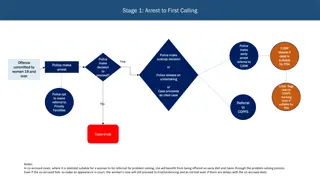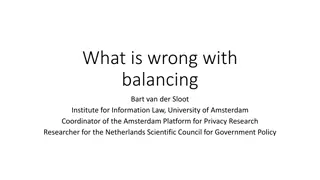Ethics in Prosecution: Balancing Justice and Duty
Delve into the complexities of prosecutorial ethics as explored in the TV series "Billions," discussing the duty of prosecutors to seek justice, ethical responsibilities outlined in the ABA Model Rule 3.8, and principles guiding federal prosecution. The narrative highlights challenges such as handling exculpatory evidence, witness flipping, and conflict of interest, offering insights into real-world examples like the DOJ's prosecution of Ted Stevens.
Download Presentation

Please find below an Image/Link to download the presentation.
The content on the website is provided AS IS for your information and personal use only. It may not be sold, licensed, or shared on other websites without obtaining consent from the author.If you encounter any issues during the download, it is possible that the publisher has removed the file from their server.
You are allowed to download the files provided on this website for personal or commercial use, subject to the condition that they are used lawfully. All files are the property of their respective owners.
The content on the website is provided AS IS for your information and personal use only. It may not be sold, licensed, or shared on other websites without obtaining consent from the author.
E N D
Presentation Transcript
Billions: Money, Financial Crime, and Legal Ethics Ethics Discussion Panel Panelists: Professor Lisa Kern Griffin (UNC); Professor Joseph Grundfest (Stanford); Melinda Haag (Orrick) 1 hour Ethics MCLE
Duty of Prosecutors Prosecutors have a special status as a minister of justice and, therefore, a special duty: to seek justice. An inscription on the walls of the Department of Justice states the proposition candidly for the federal domain: "The United States wins its point whenever justice is done its citizens in the courts." Brady v. Maryland, 373 U.S. 83, 87 (1963)
ABA Model Rule 3.8: Special Responsibilities of a Prosecutor (a) The prosecutor in a criminal case shall refrain from prosecuting a charge that the prosecutor knows is not supported by probable cause Comment: A prosecutor has the responsibility of a minister of justice and not simply that of an advocate. This responsibility carries with it specific obligations to see that the defendant is accorded procedural justice, that guilt is decided upon the basis of sufficient evidence, and that special precautions are taken to prevent and to rectify the conviction of innocent persons.
US Attorneys Manual, Title 9, Section 27 Principles of Federal Prosecution (https://www.justice.gov/usam/usam-9-27000- principles-federal-prosecution#9-27.001) promote the reasoned exercise of prosecutorial authority and contribute to the fair, evenhanded administration of the Federal criminal laws. A determination to prosecute represents a policy judgment that the fundamental interests of society require the application of the criminal laws to a particular set of circumstances recognizing both that serious violations of Federal law must be prosecuted, and that prosecution entails profound consequences for the accused and the family of the accused whether or not a conviction ultimately results.
Billions gives us a fictionalized story highlighting the many ways this prosecutorial ideal can be undermined. Minister of Justice Exculpatory evidence Flipping witnesses /informants Power Discretion Fanaticism Accountability (lack) Initiating Investigation Charging Plea deals Revolving door Conflict of Interest
Real World Examples (we acknowledge there is room to argue about the merits of these cases) DOJ Public Integrity Section prosecution of Ted Stevens Multiple examples of misconduct including Brady violations Prosecution vacated at the instruction of Eric Holder Prosecution of Duke lacrosse players One of the few cases resulting a criminal contempt conviction of the prosecutor Prosecution of Aaron Schwartz 9th Circuit Judge Alex Kozinski has recently complained of an epidemic of prosecutorial misconduct (http://www.latimes.com/local/politics/la-me-lying- prosecutors-20150201-story.html)
Initiating Prosecution Chuck Rhoades: I think long and hard before any prosecution in my office goes forward. And I'm proudest of the cases I choose not to prosecute. But when I go forward, it's full guns. U.S. Attorneys Manual, Title 9, 27.200-260 Once a U.S. Attorney has probable cause to believe a person has committed a federal offense within her/his jurisdiction, she/he has several factors to consider before deciding to initiate or decline to initiate a prosecution Initiation of prosecution is normally expected as long as probable cause exists and the attorney believes that evidence sufficient to sustain a conviction will be available and admissible at trial. Factors that may go to declining to prosecute: No substantial Federal interest would be served by prosecution; The person is subject to effective prosecution in another jurisdiction; or There exists an adequate non-criminal alternative to prosecution. (It is impermissible to consider the possible effect of the decision on the U.S. Attorney s own professional or personal position.)
Plea Agreements Axelrod s Lawyer: I sensed a possible waffle on the specifics of the plea. Connerty did commit to a no guilty plea but said he would have to reconfirm with Rhoades. Axe: What could they come with? Lawyer: At worst, the company will have to plead guilty to conspiracy. Axe: f*ck. Lawyer: Penalty is the same. Axe: An admission of guilt? If they put that in front of me tomorrow, I don't think I can sign it. U.S. Attorney Manual 9-27.420 - Plea Agreements Considerations to be Weighed In determining whether it would be appropriate to enter into a plea agreement, the attorney for the government should weigh all relevant considerations, including: The defendant's willingness to cooperate in the investigation or prosecution of others; The defendant's history with respect to criminal activity; The nature and seriousness of the offense or offenses charged; The defendant's remorse or contrition and his/her willingness to assume responsibility for his/her conduct; The desirability of prompt and certain disposition of the case; The likelihood of obtaining a conviction at trial; The probable effect on witnesses; The probable sentence or other consequences if the defendant is convicted; The public interest in having the case tried rather than disposed of by a guilty plea; The expense of trial and appeal; The need to avoid delay in the disposition of other pending cases; and The effect upon the victim's right to restitution.
Non-prosecution / Deferred prosecution Non-prosecution / Deferred prosecution agreements (NPA/DPA) have emerged as a major tool in addressing corporate wrongdoing. Prior to 2003, almost no cases were resolved through NPAs or DPAs. Beginning in 2003, however, the number of NPAs and DPAs begins to grow substantially, although the number fluctuates. From 2006 2011, 42 percent of cases were resolved with NPAs and DPAs, and in some years the combined number of NPAs and DPAs surpassed the number of pleas. [ ] The introduction of NPAs and DPAs has not been accompanied by a decline in the use of plea agreements. To the contrary, increased use of plea agreements has accompanied the rise of NPAs and DPAs, and thus an overall increase in the reach of corporate criminal enforcement. Reform Mandates. NPAs and DPAs have tended to include more provisions that waive or alter the traditional legal entitlements of corporations and more conditions relating to the corporation s governance structure when compared with plea agreements. In each time period studied, NPAs and DPAs have consistently contained larger numbers of both legal process and governance reform provisions than plea agreements. (Searle Civil Justice Institute, Trends in the Use of Non-prosecution, Deferred Prosecution, and Plea Agreements in the Settlement of Alleged Corporate Wrongdoing, Executive Summary (April 2015), available at http://masonlec.org/site/rte_uploads/files/SCJI/Executive%20Summary%20- %20SCJI%20NPA%20DPA%20Report.pdf.) U.S. Attorney Manual 9-27.620 - Entering into Non-prosecution Agreements in Return for Cooperation Considerations to be Weighed In determining whether, a person's cooperation may be necessary to the public interest, the attorney for the government, and those whose approval is necessary, should weigh all relevant considerations, including: The importance of the investigation or prosecution to an effective program of law enforcement; The value of the person's cooperation to the investigation or prosecution; and The person's relative culpability in connection with the offense or offenses being investigated or prosecuted and his/her history with respect to criminal activity.
Conflict of Interest Familial / Financial: Bryan Connerty: I don't wanna be out of line, but you might wanna consider recusing from this case. The conflict of interest... it's gonna be an issue. Revolving Door: Axe s Lawyer to Connerty: The good news is this... when you get out of there, you're starting at $1.4, easy. Better news... I'll hire you. ABA Criminal Justice Section, Standard 3-1.3 Conflicts of Interest prosecutor should avoid conflicts of interest; should not permit his or her professional judgment or obligations to be affected by his or her own political, financial, business, property, or personal interests.
Familial / Financial DOJ regulation that bars participation in a criminal investigation or prosecution if the attorney has a personal or political relationship with a person or organization (1) who is substantially involved in the conduct being investigated or prosecuted, or (2) whom the attorney knows has a specific and substantial interest that would be directly affected by the outcome of the investigation or prosecution. 28 C.F.R. 45.2(a) (1996).
Revolving Door Implicates several ethical duties, in particular loyalty and confidentiality; Also has important appearance issues ABA Model Rule 1.11(a) - "side switching rule - prohibits a former government attorney from representing a client in a matter in which the attorney participated in a substantial way for the government, even when the lawyer's subsequent representation would not be adverse to the government. The United States District Court for the District of Columbia has emphasized that, in examining cases involving former government attorneys accused of "side switching," the court "must be especially careful" for two reasons: First, because government attorneys may have had access to more kinds of information in connection with the prior representations than private attorneys typically do, there is a greater potential for misuse of information including information that is not necessarily confidential in nature . . . in the revolving door context. Second, the public is generally more concerned about government improprieties than about private improprieties. Thus, the appearance problem is more severe because the public is likely to be more critical of the potential misuse of information. United States v. Philip Morris, Inc., 312 F. Supp. 2d 27, 38 (D.D.C. 2004) (citing Brown v. D.C. Bd. of Zoning Adjustment, 486 A.2d 37, 43 (D.C. 1984) (en banc)). (Also implicates Model Rules 1.6 (revealing confidential information) and 1.9 (using confidential information)) Recusal obligations under both the administrative standards of conduct, 5 C.F.R. 2635.604(a) (2009), which apply to unilateral contacts, and the criminal conflict of interest statute, 18 U.S.C. 208 (2008), which applies to employment negotiations. An attorney is disqualified from participating in any particular matter that would affect the financial interests of a prospective employer with whom the attorney is seeking employment.
Recusals Wendy: Why don't you recuse yourself? Chuck Rhoades: Out of the question. Wendy: Why? Chuck Rhoades: Because I owe it to my team. I owe it to the public. It's my responsibility to prosecute. US Attorneys Manual: 3-2.170 Recusals When United States Attorneys, or their offices, become aware of an issue that could require a recusal in a criminal or civil matter or case as a result of a personal interest or professional relationship with parties involved in the matter, they must contact General Counsel's Office (GCO), EOUSA. The requirement of recusal does not arise in every instance, but only where a conflict of interest exists or there is an appearance of a conflict of interest or loss of impartiality.
